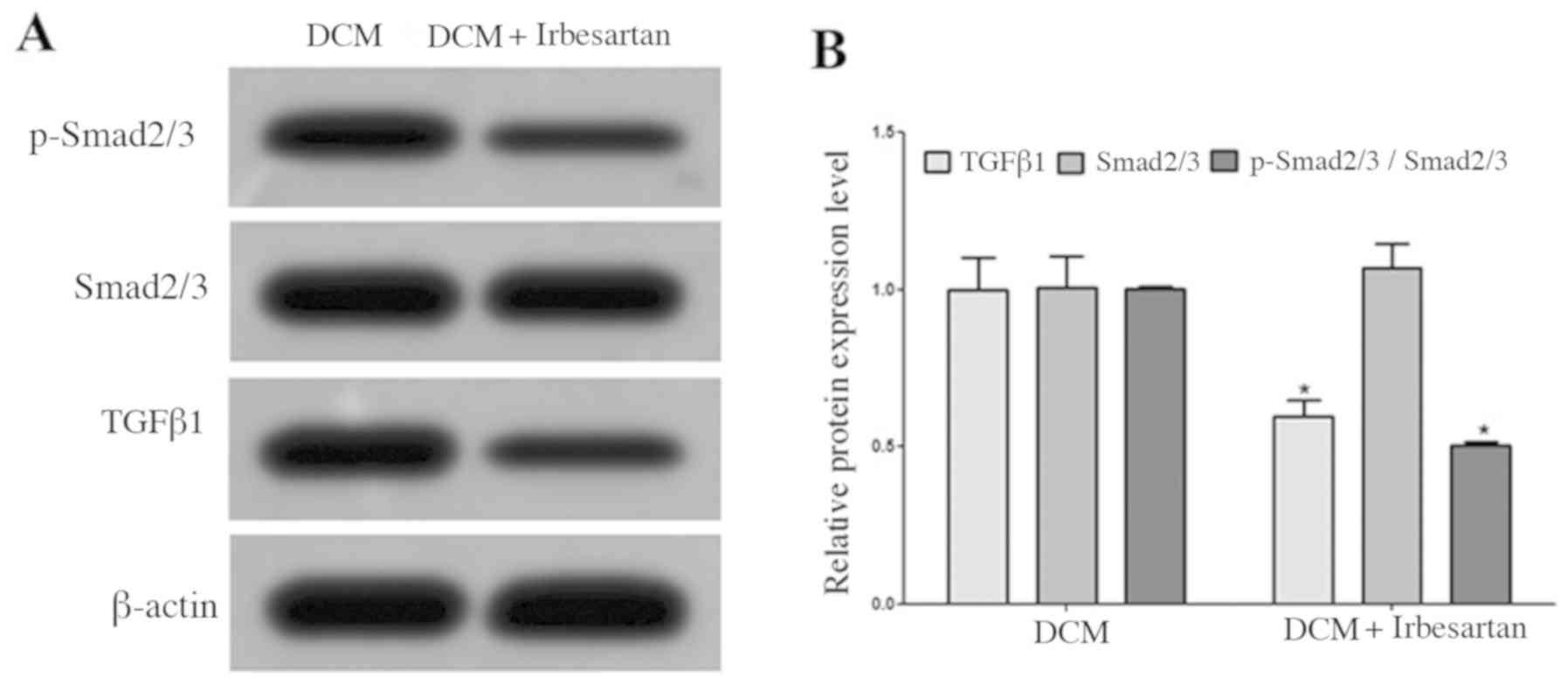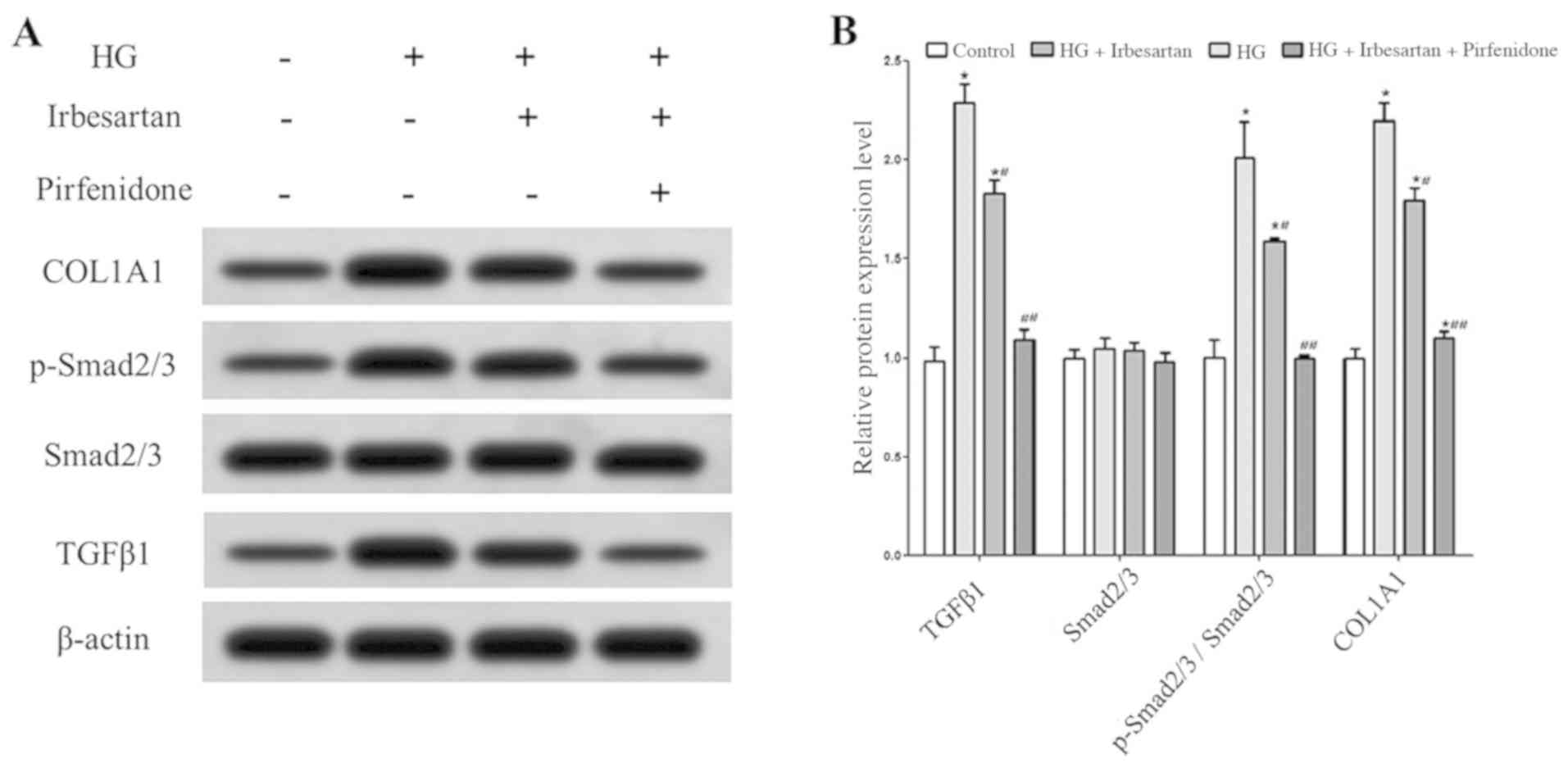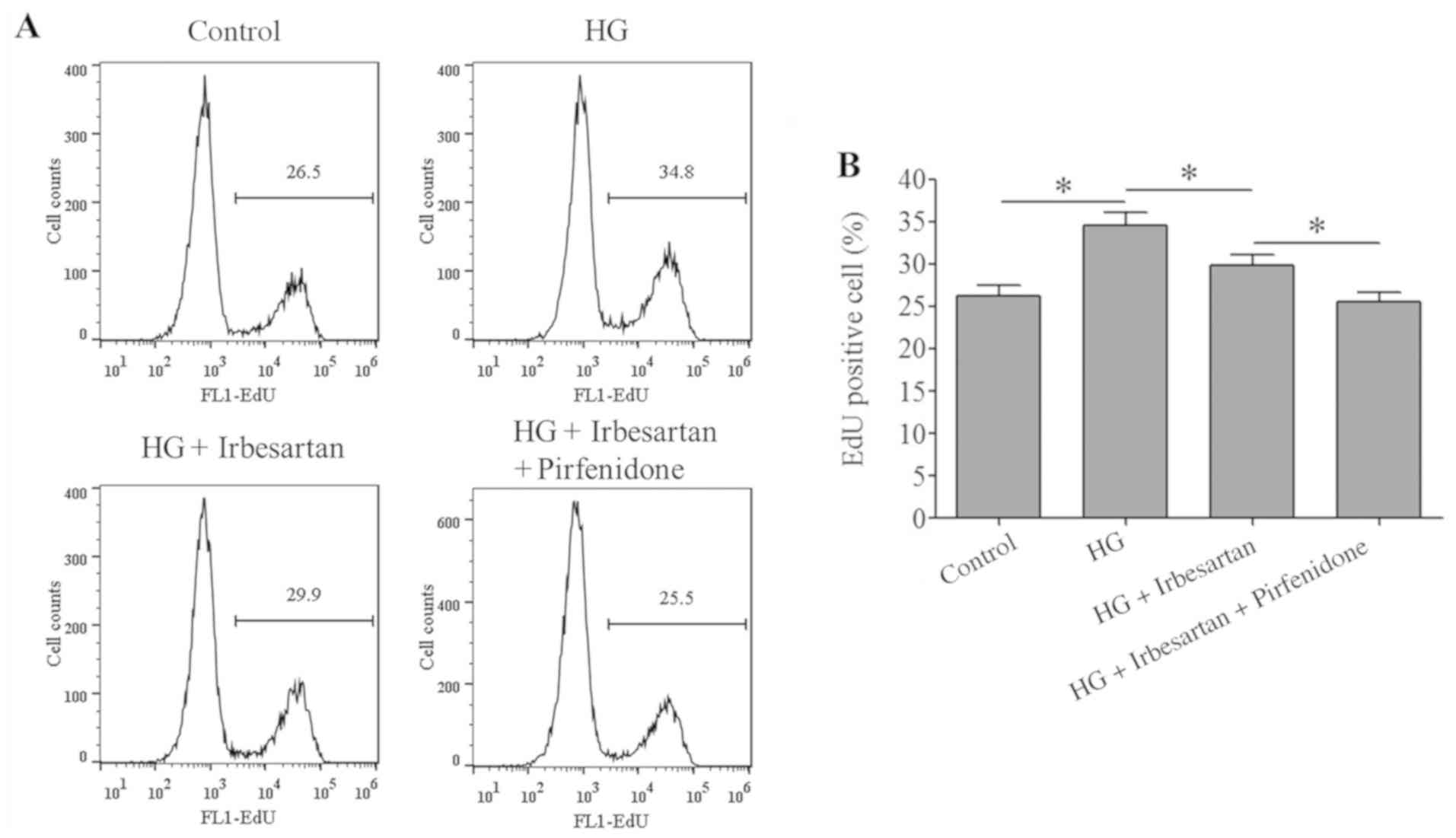|
1
|
Chen J, Wang J, Zhang X and Zhu H: Inverse
relationship between serum bilirubin levels and diabetic foot in
Chinese patients with type 2 diabetes mellitus. Med Sci Monit.
23:5916–5923. 2017.PubMed/NCBI View Article : Google Scholar
|
|
2
|
Xu T, Weng Z, Pei C, Yu S, Chen Y, Guo W,
Wang X, Luo P and Sun J: The relationship between
neutrophil-to-lymphocyte ratio and diabetic peripheral neuropathy
in type 2 diabetes mellitus. Medicine (Baltimore).
96(e8289)2017.PubMed/NCBI View Article : Google Scholar
|
|
3
|
Russo I and Frangogiannis NG:
Diabetes-associated cardiac fibrosis: Cellular effectors, molecular
mechanisms and therapeutic opportunities. J Mol Cell Cardiol.
90:84–93. 2016.PubMed/NCBI View Article : Google Scholar
|
|
4
|
Dillmann WH: Diabetic cardiomyopathy.
Circu Res. 124:1160–1162. 2019.PubMed/NCBI View Article : Google Scholar
|
|
5
|
Zhang X, Pan L, Yang K, Fu Y, Liu Y, Chi
J, Zhang X, Hong S, Ma X and Yin X: H3 relaxin protects against
myocardial injury in experimental diabetic cardiomyopathy by
inhibiting myocardial apoptosis, fibrosis and inflammation. Cell
Physiol Biochem. 43:1311–1324. 2017.PubMed/NCBI View Article : Google Scholar
|
|
6
|
Zou C, Liu X, Xie R, Bao Y, Jin Q, Jia X,
Li L and Liu R: Deferiprone attenuates inflammation and myocardial
fibrosis in diabetic cardiomyopathy rats. Biochem Biophys Res
Commun. 486:930–936. 2017.PubMed/NCBI View Article : Google Scholar
|
|
7
|
Wang L, Li J and Li D: Losartan reduces
myocardial interstitial fibrosis in diabetic cardiomyopathy rats by
inhibiting JAK/STAT signaling pathway. Int J Clin Exp Pathol.
8:466–473. 2015.PubMed/NCBI
|
|
8
|
He-He H, Chen DQ, Wang YN, Feng YL, Cao G,
Vaziri ND and Zhao YY: New insights into TGF-β/smad signaling in
tissue fibrosis. Chem Biol Interact. 2018:76–83. 2018.PubMed/NCBI View Article : Google Scholar
|
|
9
|
Meng XM, Nikolic-Paterson DJ and Lan HY:
TGF-β: The master regulator of fibrosis. Nat Rev Nephrol.
12:325–338. 2016.PubMed/NCBI View Article : Google Scholar
|
|
10
|
Xu F, Liu C, Zhou D and Zhang L:
TGF-β/SMAD pathway and its regulation in hepatic fibrosis. J
Histochem Cytochem. 64:157–167. 2016.PubMed/NCBI View Article : Google Scholar
|
|
11
|
Estato V, Obadia N, Carvalho-Tavares J,
Freitas FS, Reis P, Neto HC, Lessa MA and Tibiriçá E: Blockade of
the renin-angiotensin system improves cerebral microcirculatory
perfusion in diabetic hypertensive rats. Microvasc Res. 87:41–49.
2013.PubMed/NCBI View Article : Google Scholar
|
|
12
|
Wong TC, Piehler KM, Kang IA, Kadakkal A,
Kellman P, Schwartzman DS, Mulukutla SR, Simon MA, Shroff SG,
Kuller LH and Schelbert EB: Myocardial extracellular volume
fraction quantified by cardiovascular magnetic resonance is
increased in diabetes and associated with mortality and incident
heart failure admission. Eur Heart J. 35:657–664. 2014.PubMed/NCBI View Article : Google Scholar
|
|
13
|
Patel BM and Mehta AA: Aldosterone and
angiotensin: Role in diabetes and cardiovascular diseases. Eur J
Pharmacol. 697:1–12. 2012.PubMed/NCBI View Article : Google Scholar
|
|
14
|
Parving HH, Lehnert H, Bröchner-Mortensen
J, Gomis R, Andersen S and Arner P: Irbesartan in Patients with
Type 2 Diabetes and Microalbuminuria Study Group. The effect of
irbesartan on the development of diabetic nephropathy in patients
with type 2 diabetes. N Engl J Med. 345:870–878. 2001.PubMed/NCBI View Article : Google Scholar
|
|
15
|
Croom KF, Curran MP, Goa KL and Perry CM:
Irbesartan: A review of its use in hypertension and in the
management of diabetic nephropathy. Drugs. 64:999–1028.
2004.PubMed/NCBI View Article : Google Scholar
|
|
16
|
Nako H, Kataoka K, Koibuchi N, Dong YF,
Toyama K, Yamamoto E, Yasuda O, Ichijo H, Ogawa H and Kim-Mitsuyama
S: Novel mechanism of angiotensin II-induced cardiac injury in
hypertensive rats: The critical role of ASK1 and VEGF. Hypertens
Res. 35:194–200. 2012.PubMed/NCBI View Article : Google Scholar
|
|
17
|
Castoldi G, Di Gioia CR, Bombardi C,
Catalucci D, Corradi B, Gualazzi MG, Leopizzi M, Mancini M, Zerbini
G, Condorelli G and Stella A: MiR-133a regulates collagen 1A1:
Potential role of miR-133a in myocardial fibrosis in angiotensin
II-dependent hypertension. J Cell Physiol. 227:850–856.
2012.PubMed/NCBI View Article : Google Scholar
|
|
18
|
Whaley-Connell A, Habibi J, Cooper SA,
Demarco VG, Hayden MR, Stump CS, Link D, Ferrario CM and Sowers JR:
Effect of renin inhibition and AT1R blockade on myocardial
remodeling in the transgenic ren2 rat. Am J Physiol Endocrinol
Metab. 295:E103–E109. 2008.PubMed/NCBI View Article : Google Scholar
|
|
19
|
National Research Council (US) Committee
for the Update of the Guide for the Care and Use of Laboratory
Animals: Guide for the Care and Use of Laboratory Animals. 8th
edition. National Academies Press, Washington, DC, 2011. Available
from: https://www.ncbi.nlm.nih.gov/books/NBK54050/
doi: 10.17226/12910.
|
|
20
|
Dai H, Zheng M, Tang Rn, Ma Kl, Ni J and
Liu BC: Inhibition of integrin-linked kinase by angiotensin II
receptor antagonist, irbesartan attenuates podocyte injury in
diabetic rats. Chin Med J (Engl). 125:888–893. 2012.PubMed/NCBI
|
|
21
|
Guo Y, Gupte M, Umbarkar P, Singh AP, Sui
JY, Force T and Lal H: Entanglement of GSK-3β, β-catenin and TGF-β1
signaling network to regulate myocardial fibrosis. J Mol Cell
Cardiol. 110:109–120. 2017.PubMed/NCBI View Article : Google Scholar
|
|
22
|
Yang D, Li L, Qian S and Liu L: Evodiamine
ameliorates liver fibrosis in rats via TGF-beta1/smad signaling
pathway. J Natl Med. 72:145–154. 2017.PubMed/NCBI View Article : Google Scholar
|
|
23
|
Yang T, Wang J, Pang Y, Dang X, Ren H, Liu
Y, Chen M and Shang D: Emodin suppresses silica-induced lung
fibrosis by promoting sirt1 signaling via direct contact. Mol Med
Rep. 14:4643–4649. 2016.PubMed/NCBI View Article : Google Scholar
|
|
24
|
Li H, Cai H, Deng J, Tu X, Sun Y, Huang Z,
Ding Z, Dong L, Chen J, Zang Y and Zhang J: TGF-beta-mediated
upregulation of sox9 in fibroblast promotes renal fibrosis. Biochim
Biophys Acta Mol Basis Dis. 1864:520–532. 2018.PubMed/NCBI View Article : Google Scholar
|
|
25
|
Kajdaniuk D, Marek B, Borgiel-Marek H and
Kos-Kudła B: Transforming growth factor β1 (TGFβ1) in physiology
and pathology. Endokrynol Pol. 64:384–396. 2013.PubMed/NCBI View Article : Google Scholar
|
|
26
|
Chen G, Grotendorst G, Eichholtz T and
Khalil N: GM-CSF increases airway smooth muscle cell connective
tissue expression by inducing TGF-β receptors. Am J Physiol Lung
Cell Mol Physiol. 284:L548–L556. 2003.PubMed/NCBI View Article : Google Scholar
|
|
27
|
Loboda A, Sobczak M, Jozkowicz A and Dulak
J: TGF-beta1/smads and miR-21 in renal fibrosis and inflammation.
Med Inflamm. 2016(8319283)2016.PubMed/NCBI View Article : Google Scholar
|
|
28
|
Li Y, Yang Y, Yu D and Liang Q: The effect
of tanshinone IIA upon the TGF-beta1/smads signaling pathway in
hypertrophic myocardium of hypertensive rats. J
HuazhongUnivSciTechnolog Med Sci. 29:476–480. 2009.PubMed/NCBI View Article : Google Scholar
|
|
29
|
Yuan X, Gong Z, Wang B, Guo X, Yang L, Li
D and Zhang Y: Astragaloside inhibits hepatic fibrosis by
modulation of TGF-beta1/smad signaling pathway. evidence-based
complementary and alternative medicine. Evid Based Complement
Alternat Med. 2018(3231647)2018.PubMed/NCBI View Article : Google Scholar
|
|
30
|
Wang S, Zhao X, Yan S, Chen B and Shi J:
Knockdown of NLRC5 inhibits renal fibroblast activation via
modulating TGF-beta1/smad signaling pathway. Eur J Pharmacol.
829:38–43. 2018.PubMed/NCBI View Article : Google Scholar
|
|
31
|
Yu B, Li W, Al F and Chen Z: MicroRNA-33a
deficiency inhibits proliferation and fibrosis through inactivation
of TGF-beta/smad pathway in human cardiac fibroblasts. Pharmazie.
72:456–460. 2017.PubMed/NCBI View Article : Google Scholar
|
|
32
|
Zhang Y, Shao L, Ma A, Guan G, Wang J,
Wang Y and Tian G: Telmisartan delays myocardial fibrosis in rats
with hypertensive left ventricular hypertrophy by TGF-beta1/smad
signal pathway. Hypertens Res. 37:43–49. 2014.PubMed/NCBI View Article : Google Scholar
|
|
33
|
Zhang ZZ, Cheng YW, Jin HY, Chang Q, Shang
QH, Xu YL, Chen LX, Xu R, Song B and Zhong JC: The sirtuin 6
prevents angiotensin II-mediated myocardial fibrosis and injury by
targeting AMPK-ACE2 signaling. Oncotarget. 8:72302–72314.
2017.PubMed/NCBI View Article : Google Scholar
|
|
34
|
Roth L, Schrijvers DM, Martinet W and De
Meyer GR: Angiotensin II increases coronary fibrosis, cardiac
hypertrophy and the incidence of myocardial infarctions in
ApoE-/- Fbn1C1039G+/- mice. Acta Cardiol.
71:483–488. 2016.PubMed/NCBI View Article : Google Scholar
|
|
35
|
Chen Q, Pang L, Huang S, Lei W and Huang
D: Effects of emodin and irbesartan on ventricular fibrosis in
goldblatt hypertensive rats. Pharmazie. 69:374–378. 2014.PubMed/NCBI
|
|
36
|
Ritchie RH, Zerenturk EJ, Prakoso D and
Calkin AC: Lipid metabolism and its implications for type 1
diabetes-associated cardiomyopathy. J Mol Endocrinol. 58:R225–R240.
2017.PubMed/NCBI View Article : Google Scholar
|
|
37
|
Shen N, Li X, Zhou T, Bilal MU, Du N, Hu
Y, Qin W, Xie Y, Wang H, Wu J, et al: Shensong Yangxin capsule
prevents diabetic myocardial fibrosis by inhibiting TGF-beta1/smad
signaling. J Ethnopharmacol. 157:161–170. 2014.PubMed/NCBI View Article : Google Scholar
|
|
38
|
Lv J, Wang Z and Wang Y, Sun W, Zhou J,
Wang M, Liu WJ and Wang Y: Renoprotective effect of the
shen-yan-fang-shuai formula by inhibiting TNF-alpha/NF-kappaB
signaling pathway in diabetic rats. J Diabetes Res.
2017(4319057)2017.PubMed/NCBI View Article : Google Scholar
|
|
39
|
Tunçdemir M and Oztürk M: The effects of
angiotensin-II receptor blockers on podocyte damage and glomerular
apoptosis in a rat model of experimental streptozotocin-induced
diabetic nephropathy. Acta Histochem. 113:826–832. 2011.PubMed/NCBI View Article : Google Scholar
|
|
40
|
Chen C, Liang Z, Chen Q and Li ZG:
Irbesartan and emodin on myocardial remodeling in Goldblatt
hypertensive rats. J Cardiovasc Pharm. 60:375–380. 2012.PubMed/NCBI View Article : Google Scholar
|
|
41
|
Kataoka N, Nishida K, Kinoshita K,
Sakamoto T, Nakatani Y, Tsujino Y, Mizumaki K, Inoue H and Kinugawa
K: Effect of irbesartan on development of atrial fibrosis and
atrial fibrillation in a canine atrial tachycardia model with left
ventricular dysfunction, association with p53. Heart Vessels.
31:2053–2060. 2016.PubMed/NCBI View Article : Google Scholar
|
|
42
|
Tanaka J, Tajima S, Asakawa K, Sakagami T,
Moriyama H, Takada T, Suzuki E and Narita I: Preventive effect of
irbesartan on bleomycin-induced lung injury in mice. Respir
Investig. 51:76–83. 2013.PubMed/NCBI View Article : Google Scholar
|
|
43
|
Zhao G, Zhao H, Tu L, Xu X, Zheng C, Jiang
M, Wang P and Wang D: Effects and mechanism of irbesartan on
tubulointerstitial fibrosis in 5/6 nephrectomized rats. J Huazhong
Univ Sci Technol Med Sci. 30:48–54. 2010.PubMed/NCBI View Article : Google Scholar
|
|
44
|
Kim MY, Baik SK, Park DH, Jang YO, Suk KT,
Yea CJ, Lee IY, Kim JW, Kim HS, Kwon SO, et al: Angiotensin
receptor blockers are superior to angiotensin-converting enzyme
inhibitors in the suppression of hepatic fibrosis in a bile
duct-ligated rat model. J Gastroenterol. 43:889–896.
2008.PubMed/NCBI View Article : Google Scholar
|
|
45
|
Pellman J, Zhang J and Sheikh F:
Myocyte-Fibroblast communication in cardiac fibrosis and
arrhythmias: Mechanisms and model systems. J Mol Cell Cardiol.
94:22–31. 2016.PubMed/NCBI View Article : Google Scholar
|
|
46
|
Ivey MJ and Tallquist MD: Defining the
cardiac fibroblast. Circ J. 80:2269–2276. 2016.PubMed/NCBI View Article : Google Scholar
|
|
47
|
Jin-Cheng L, Zhou L, Wang F, Cheng ZQ and
Rong C: Osthole decreases collagen Ⅰ/III contents and their ratio
in TGF-β1-overexpressed mouse cardiac fibroblasts through
regulating the TGF-β/smad signaling pathway. Chin J Nat Med.
16:321–329. 2018.PubMed/NCBI View Article : Google Scholar
|
|
48
|
Eriksen HA, Satta J, Risteli J, Veijola M,
Väre P and Soini Y: Type I and type III collagen synthesis and
composition in the valve matrix in aortic valve stenosis.
Atherosclerosis. 189:91–98. 2006.PubMed/NCBI View Article : Google Scholar
|
|
49
|
Liu X, Xu Q, Wang X, Zhao Z, Zhang L,
Zhong L, Li L, Kang W, Zhang Y and Ge Z: Irbesartan ameliorates
diabetic cardiomyopathy by regulating protein kinase D and ER
stress activation in a type 2 diabetes rat model. Pharmacol Res.
93:43–51. 2015.PubMed/NCBI View Article : Google Scholar
|

















